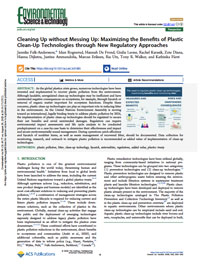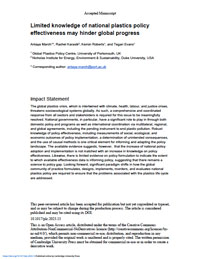Publications
The Use of Plastic as a Household Fuel Among the Urban Poor in the Global South
Increasing plastic waste pollution has led to a rising prevalence of the open burning of plastic waste, especially in locations lacking formal waste-management systems. Poor, urban communities in the Global South face particularly acute challenges in accessing both organized waste-collection services and low-cost traditional energy sources, and clean cooking fuel alternatives tend to be unaffordable for their low-income residents.
Do Plastic Clean-Up Technologies Work? What Research Does (and Doesn't) Tell Us
Across all available literature, effectiveness data on plastic pollution clean-up technologies were under-reported, lacked standardization, and were rarely tested by a neutral third party. This makes it difficult to make informed decisions when choosing which clean-up technology to deploy and evaluating the environmental impact of these technologies.
Initial Assessment of Gender Considerations in Plastics Policy
Globally, women are disproportionately burdened and impacted by the harmful effects of plastic across the life cycle of products. These burdens vary across cultural, socioeconomic, and political contexts, and based on how women engage with plastic, but broadly include health and safety impacts, access to opportunities in the waste sector, and exposures to harmful plastic-associated chemicals. This initial assessment considers how women, people who are assigned female at birth and have been socialized as females, and/or female-identified people are considered in plastics policy scope and implementation.
2023 Annual Trends in Plastics Policy: A Brief
In the first annual update of Annual Trends in Plastics Policy, Nicholas Institute researchers find that plastics policy enactment continues to surge and was not negatively affected by the COVID-19 pandemic. To better gauge policy implementation, researchers established a new effectiveness policy library to accompany the 2022 update. These studies indicate that, while underused in existing policy, greater governmental use of economic instruments (e.g., taxes, fees, levies) and information instruments (e.g., awareness campaigns to communicate other instruments to the public, education initiatives, etc.) would aid in enacting effective policies in the future.
Cleaning Up without Messing Up: Maximizing the Benefits of Plastic Clean-Up Technologies through New Regulatory Approaches
As the global plastics crisis grows, numerous technologies have been invented and implemented to recover plastic pollution from the environment. Although laudable, unregulated clean-up technologies may be inefficient and have unintended negative consequences on ecosystems, for example, through bycatch or removal of organic matter important for ecosystem functions. Despite these concerns, plastic clean-up technologies can play an important role in reducing litter in the environment.
Limited Knowledge of National Plastics Policy Effectiveness May Hinder Global Progress
Policy effectiveness is a critical measure for assessing whether policies are working and determining necessary adjustments. However, understanding the effectiveness of plastic policies is a significant gap in the toolkit driving solutions to the plastics crisis. This review examines effectiveness evaluations and existing tools for assessing policy effectiveness.The review further identifies the barriers to understanding effectiveness before proposing ways forward. Most studies focus on plastic bag bans or taxes, neglecting other policy instruments.
Editorial: Emerging Challenges and Solutions for Plastic Pollution
In a special issue of Frontiers in Marine Science, “Emerging Challenges and Solutions for Plastic Pollution,” these authors and others provide a transdisciplinary collection of articles exploring plastic pollution issues and hypothesizing solutions. The topic is broad to include diverse approaches as contributions from all stakeholders are needed to provide a full perspective on the plastic waste problem.
Inequitable Distribution of Plastic Benefits and Burdens on Economies and Public Health
Members of Duke University's Plastic Pollution Working Group examine the unequal distribution of benefits and burdens of plastics. They find the benefits of plastics to communities and stakeholders are principally economic, whereas their burdens fall largely on human health. The report stresses the need for policy design to include health burdens to all impacted stakeholders across all plastic life stages and urges the Intergovernmental Negotiating Committee to consider harmful effects across the entire plastic lifecycle and to apply the precautionary principle when drafting the upcoming international global plastic treaty.
Voluntary Commitments Made by the World’s Largest Companies Focus on Recycling and Packaging Over Other Actions to Address the Plastics Crisis
In a study published by the journal One Earth, Duke experts share findings from an examination of the types of commitments that corporations have made to address global plastic pollution. The authors find that, rather than tackle virgin plastics, most companies target packaging and general plastics and frequently emphasize recycling-related efforts. While many large and important companies are making commitments, significantly more efforts beyond plastic recycling are required to effectively address plastic pollution challenges.
A Transdisciplinary Approach to Reducing Global Plastic Pollution
In a commentary published by Frontiers in Marine Science, Duke experts outline evidence underscoring the urgency of the plastic policy crisis and recommend novel research-based interventions. The interdisciplinary group of authors are part of Duke's Plastic Pollution Working Group.










